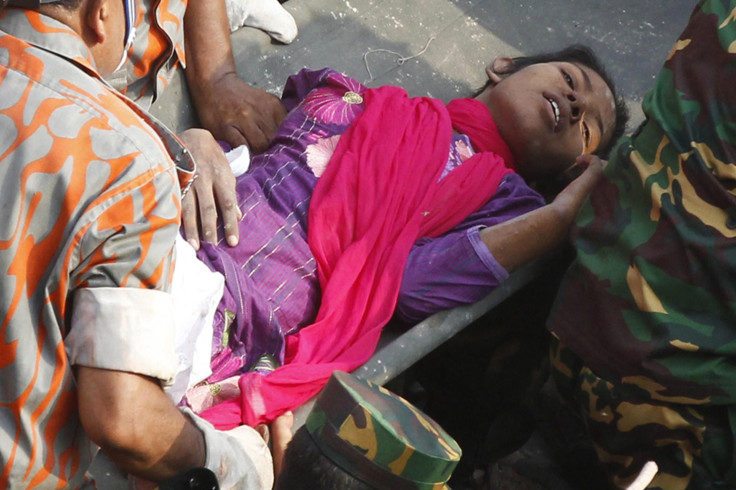Woman Found Alive After 17 Days Under Collapsed Bangladeshi Clothing Factory, Death Toll Tops 1,000, Govt Shuts Down Three Factories For Unsafe Work Conditions

Rescuers at a Bangladeshi clothing factory that collapsed 17 days ago found a woman alive Friday, but the death toll now tops 1,000. The government, meanwhile, closed three factories owned by Nassa Group, the nation’s largest clothing manufacturer, for safety violations.
Army officials ordered workers clearing the wreckage to stop using bulldozers and cranes once they heard the sound of tapping on concrete inside the rubble. Shortly after that, voice contact was made with the woman, a seamstress named Reshma Begum.
"I heard the sound and rushed towards the spot," a rescue worker said. "I knelt down and heard a faint voice. 'Sir, please help me,' she cried," the worker told the Wall Street Journal.
About 40 minutes later they pulled the woman, who said she was unhurt, from the wreckage. She had been trapped between a column and a beam in a prayer room and stayed alive by breathing through a pipe. She also found food by scavenging through the rucksacks of dead colleagues, the Journal reported. Medical workers took her to a hospital for an evaluation.
The death toll had risen to 1,050 by Friday afternoon, local time.
According to the Wall Street Journal, the country began investigating factories of the Nassa Group -- which creates clothing for several large American retailers including Wal-Mart Stores (NYSE:WMT) and Sears Holdings (Nasdaq:SHLD) -- in light of the April collapse of the Rana Plaza garment factory. Following inspections of Bangladesh’s 5,000+ garment factories, the government announced the closure of 18 different factories on Wednesday. Three of the factories named by the government belong to Nassa Group, the nation’s largest clothing manufacturer. The other 15 belong to smaller producers. Bangladesh has stated that the factories will reopen if safety conditions improve.
Around 2,500 people have been rescued from the Rana Plaza building in the two weeks since the collapse. The Wall Street Journal reported on Wednesday that none of the 70 retailers who owned space in the building plan to scale back production. Last week, the collapsed building's owner, Sohel Rana, and two engineers who issued the building's permits, were arrested.
The Rana Plaza collapse has been blamed on poor building construction and a lack of adherence to safety codes. Since the collapse, Bangladesh officials have launched investigations into the country’s thousands of factories. Already, three Nassa Group factories -- Nassa Fashions, Bay Pacific Enterprise and New World Apparel -- have been shut down for “visible cracks in exterior walls.”
A Sears spokesman confirmed to the Wall Street Journal that Nassa provides clothing for the retailer, but did not clarify whether or not Sears Holdings was aware of the factories’ safety conditions.
“We were not aware of structural safety issues with this factory," the spokesman said. "But based on our last audit, we have been working on various issues unrelated to structural safety."
Spokespeople for Wal-Mart would not respond to questions.
Activists have championed the government’s attempts to shut down unsafe factories, but have questioned whether or not Bangladesh will maintain its commitment to worker safety once the Rana Plaza collapse is no longer in the public eye.
"There is no chance this will be sustained unless major brands and retailers commit to raise prices so factories can afford the renovations that are essential to prevent future disasters," Scott Nova, executive director of the Worker Rights Consortium, told the Washington Post. "If that does not happen, the government's unusual foray into actual regulation will be short-lived."
© Copyright IBTimes 2024. All rights reserved.





















